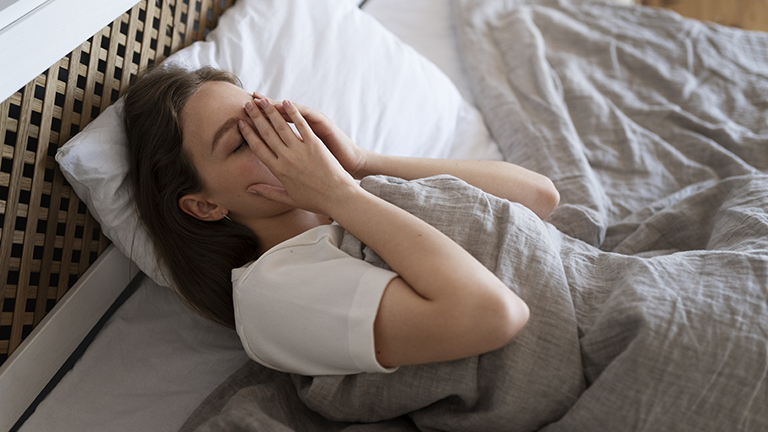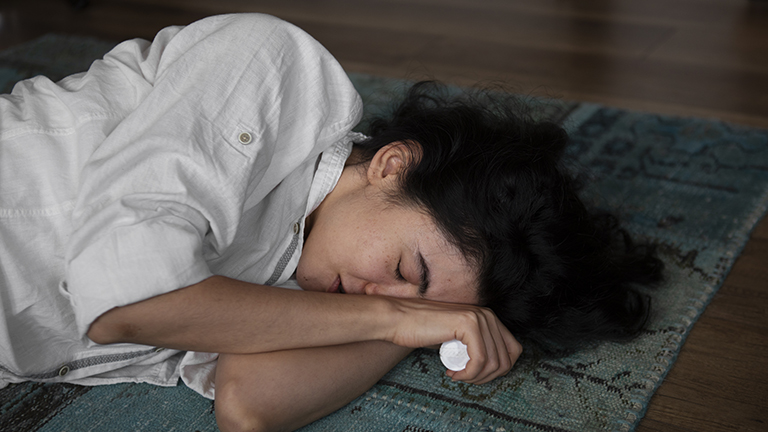Anxiety can disrupt sleep, making it difficult to reach deep, restorative stages. Deep Sleep for Anxiety Sufferers, This article explores practical evening routines to improve deep sleep and reduce nighttime stress.
Introduction: Understanding the Link Between Anxiety and Sleep
Many anxiety sufferers struggle with falling asleep or maintaining deep, restorative sleep. Anxiety triggers hyperarousal of the nervous system, increasing cortisol and adrenaline levels, which interfere with the natural sleep cycle. This article will explore evidence-based strategies and expert recommendations to help anxiety sufferers improve their deep sleep through an effective evening routine.
Why Deep Sleep is Crucial for Anxiety Sufferers
Deep sleep, or slow-wave sleep, is essential for physical restoration, cognitive function, and emotional regulation. Anxiety can disrupt deep sleep, leading to fatigue, poor concentration, and heightened stress. According to Sleep Foundation, regular deep sleep reduces the intensity of anxious thoughts and improves overall mental health.
[INSERT_ELEMENTOR id=”5755″]
Creating an Evening Routine to Promote Deep Sleep
Limit Screen Time and Blue Light Exposure
Electronic devices emit blue light, which suppresses melatonin, the hormone responsible for sleep onset. Experts suggest avoiding screens at least 60 minutes before bedtime. Alternatively, use blue light filters or glasses to reduce exposure. Healthline recommends dim lighting in the evening to signal the brain that it’s time to relax.
Relaxation Techniques for Bedtime
Relaxation Techniques for Bedtime: Progressive muscle relaxation (PMR), deep breathing, and listening to calming music are effective methods to prepare the body for sleep. Taking a warm bath or shower can also relax muscles and reduce stress. These techniques lower heart rate, ease tension, and create a peaceful mindset conducive to deep, restorative sleep for anxiety sufferers.
Guided Meditation and Mindfulness Practices
Mindfulness meditation can significantly decrease anxiety and improve sleep quality. Apps like Calm and Headspace provide guided sessions specifically designed for nighttime relaxation. Research shows that mindfulness reduces rumination and intrusive thoughts that interfere with sleep. (NCBI)
Gentle Yoga and Stretching for Nighttime
Gentle Yoga and Stretching for Nighttime: Engaging in gentle yoga and stretching exercises before bed can significantly enhance relaxation and improve deep sleep for anxiety sufferers. Poses like legs-up-the-wall, child’s pose, and cat-cow help release tension in the back, shoulders, and neck while calming the nervous system. Stretching promotes circulation, eases muscle stiffness, and encourages the parasympathetic nervous system, which reduces heart rate and stress hormones. Regular practice of these gentle routines not only prepares the body for restful sleep but also supports emotional balance and reduces anxiety, creating a soothing bedtime ritual that fosters restorative deep sleep.
Breathing Exercises to Calm the Nervous System
Breathing Exercises to Calm the Nervous System: Practising controlled breathing techniques before bed can significantly reduce anxiety and improve deep sleep. Methods like 4-7-8 breathing, diaphragmatic breathing, and alternate nostril breathing help slow the heart rate, lower cortisol levels, and activate the parasympathetic nervous system. These exercises promote a sense of calm, reduce muscle tension, and quiet racing thoughts that interfere with sleep. Incorporating a daily breathing routine in the evening can help anxiety sufferers transition smoothly into restorative sleep, enhance relaxation, and improve overall sleep quality.
Optimise Your Sleep Environment
Creating a sleep-friendly environment is crucial. Maintain a cool room temperature (65-68°F), reduce noise, and ensure complete darkness. Investing in blackout curtains, comfortable bedding, and white noise machines can significantly improve sleep quality. Sleep Foundation emphasises that the bedroom should be reserved for sleep only, avoiding work or stressful activities.
Use of Natural Sleep Aids and Supplements
Herbal supplements like chamomile, valerian root, and passionflower can promote relaxation. Melatonin is effective for regulating circadian rhythm but should be used under professional guidance. Always consult a healthcare provider before adding supplements, especially if you are taking medications. (WebMD)
Journaling and Cognitive Techniques to Reduce Nighttime Worry
Journaling and Cognitive Techniques to Reduce Nighttime Worry: Writing down anxious thoughts in a journal before bed can help unload mental stress and prevent rumination that disrupts sleep. Techniques from Cognitive Behavioural Therapy for Insomnia (CBT-I), such as thought reframing, worry scheduling, and listing positive experiences, are effective in managing nighttime anxiety. Journaling provides a structured way to process emotions, gain perspective, and create a sense of closure for the day. Regular practice of these cognitive strategies can reduce mental clutter, calm the mind, and enhance the quality of deep, restorative sleep for anxiety sufferers.
Managing Caffeine, Alcohol, and Food Intake
Managing Caffeine, Alcohol, and Food Intake: Consuming caffeine or alcohol late in the day can interfere with deep sleep by disrupting the natural sleep cycle and increasing nighttime awakenings. Caffeine should ideally be avoided after mid-afternoon, while alcohol should be limited, especially close to bedtime. Heavy or spicy meals should be consumed at least 2-3 hours before sleeping to prevent indigestion or discomfort. Focusing on light, sleep-friendly snacks containing tryptophan or magnesium can promote relaxation. Proper dietary choices in the evening help regulate the nervous system and support restorative, deep sleep for anxiety sufferers.
Establishing Consistent Sleep and Wake Times
Establishing Consistent Sleep and Wake Times: Maintaining a regular sleep schedule is crucial for regulating the body’s circadian rhythm and improving deep sleep quality. Going to bed and waking up at the same time every day—even on weekends—helps the body anticipate sleep, making it easier to fall asleep and wake naturally. Consistency reduces sleep fragmentation, enhances sleep efficiency, and lowers anxiety associated with irregular sleep patterns. Over time, a stable routine reinforces the natural sleep-wake cycle, promotes restorative deep sleep, and supports overall physical and mental health for anxiety sufferers.
Lifestyle Habits That Affect Sleep Quality
Lifestyle Habits That Affect Sleep Quality: Daily habits significantly impact sleep quality and deep sleep for anxiety sufferers. Regular physical activity, such as walking, swimming, or light cardio, improves sleep latency and efficiency. A balanced diet rich in magnesium, tryptophan, and antioxidants supports relaxation and healthy sleep patterns. Limiting screen time, managing stress through mindfulness or meditation, and avoiding late-night stimulants also contribute to better sleep. Consistently practising these lifestyle habits promotes restorative deep sleep, reduces anxiety, and enhances overall physical and mental well-being.
When to Seek Professional Help
When to Seek Professional Help: If sleep difficulties persist despite following an evening routine and practising relaxation techniques, consulting a sleep specialist or mental health professional is recommended. Chronic insomnia, severe anxiety, restless leg syndrome, or other sleep disorders may require targeted interventions, including therapy, medication, or specialised sleep studies. Professional guidance can help identify underlying causes, provide personalised treatment plans, and ensure anxiety sufferers achieve consistent, restorative deep sleep and improve overall well-being.
Conclusion
Deep sleep for anxiety sufferers is achievable with a well-designed evening routine. Limiting screen exposure, practising relaxation techniques, optimising the sleep environment, and maintaining consistent sleep schedules can transform sleep quality and reduce anxiety symptoms. Integrating these strategies gradually allows the body and mind to adjust, leading to restorative, deep sleep. For further expert guidance, consult Sleep Foundation or Anxiety & Depression Association of America.
Summary Table: Evening Routine Steps for Deep Sleep
| Step | Action | Benefit |
|---|---|---|
| 1 | Limit screen time 1 hour before bed | Reduces blue light exposure, improves melatonin secretion |
| 2 | Relaxation techniques (bath, music, PMR) | Relieves physical tension, calms nervous system |
| 3 | Guided meditation or mindfulness | Reduces rumination, lowers anxiety |
| 4 | Gentle yoga or stretching | Activates parasympathetic nervous system |
| 5 | Breathing exercises | Reduces heart rate and cortisol |
| 6 | Optimize sleep environment | Promotes restful, uninterrupted sleep |
| 7 | Use natural sleep aids (if needed) | Supports relaxation and sleep onset |
| 8 | Journaling and cognitive techniques | Offloads mental stress, prevents rumination |
| 9 | Manage diet, caffeine, and alcohol intake | Prevents sleep disruption |
| 10 | Maintain consistent sleep and wake times | Regulates circadian rhythm, improves sleep efficiency |


